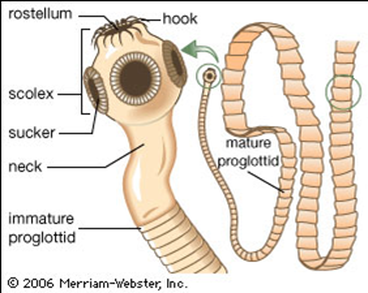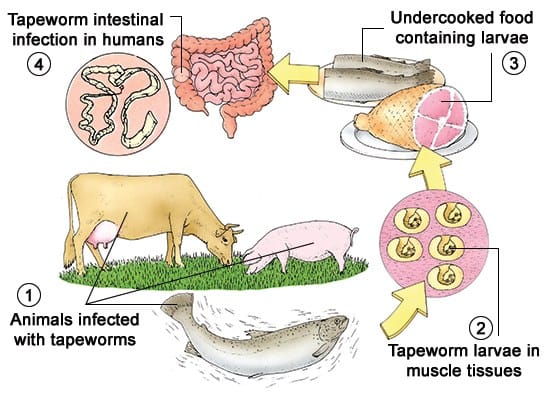Tapeworm symptoms and treatment in humans
Tapeworms are a common intestinal parasite in humans
Parasites in humans are generally disturbing to think about, but even among human parasites, tapeworms seem to freak people out more than other critters. You may have even heard the stories about recent reports of a man who died after a tapeworm growing inside him was found to be cancerous, and another being told he had only 30 minutes to live after discovering a tapeworm inside his brain.
While you may have seen a scary video of strange worms wiggling inside of someone’s intestine and you get nervous every time your stomach moves, the reality is in most cases tapeworms do not cause serious injury when you kill them by regularly doing a parasite cleanse.
What are tapeworms in humans?
Tapeworm infections (taeniasis) is a common name for a cestode infection. The most common types of cestodes in humans are fish tapeworm (Diphyllobothrium latum), beef (Taenia saginata) and pork (Taenia solium). Of these three species, the most common one to infect people in the United States is Taenia solium, commonly called pork tapeworm. (citation: 1) While the fish tapeworm is less common, every year the number of people who get infected with it grows. (citation: 2)
The worms head is called a scolex. The scolex has a number of hooks and suckers that attach to the wall of a person’s intestine. By attaching to the intestine of a person the tapeworm is able to obtain the nutrients it needs from the human host to survive. As the tapeworm grows in size and length new segments called proglottids will evolve. These new tapeworm proglottids segments will contain eggs that are able to be expelled by the stool in an attempt to spread the infection to other hosts.

How common are tapeworm infections?
There are over 100 million worldwide cases reported of tapeworm infections every year worldwide. (citation: 3).
The number of unreported cases is significantly higher. There is no part of the globe where people are immune from acquiring tapeworms. Anywhere beef, pork or fish is on the menu you can find the potential for tapeworm infections to occur.
Are tapeworm infections contagious?
The most common way people become infected with tapeworms is by ingesting undercooked meat from an animal that is infected with tapeworms. Animals can carry the tapeworms in their muscle tissue. When you consume food or water that is contaminated with tapeworm eggs or larvae you allow the infection to enter your system.
You can also get infected with tapeworms from the person who prepares your food. Tapeworms expel their eggs and body parts through human feces. If the person who prepares the meal does not properly wash their hands after using the restroom, then the parasite matter can pass from their hands to your food and infect you.

What are signs and symptoms of a tapeworm infection?
Depending on how aggressive the tapeworm infection is you can show symptoms of:
- Nausea
- Loss of appetite.
- Abdominal pain or cramping.
- Weight loss from the parasites absorbing your nutrients before you can absorb them.
- Cognitive issues like decreased concentration and fatigue.
- Difficulty falling asleep.
- The appearance of tapeworm segments in your stool.
How to diagnosis a tapeworm infection in humans?
Your doctor will likely rely on one of the following tests to confirm a tapeworm infection:
Stool sample analysis – If your doctor suspects that you have a tapeworm infection they may order a stool sample to send to a laboratory for testing. Laboratories have advanced microscopic identification equipment that can be used to identify eggs or tapeworm segments in specimens. Unfortunately, eggs and segments are not passed in your stool every time you go to the restroom. You might need to provide several samples over a week to make a positive identification of the tapeworm infection. Sometimes eggs may be present around the anus, and your doctor might want to try and collect egg samples by applying a transparent adhesive piece of tape to your anus for collecting samples.
Blood test – For tapeworm infections that have spread throughout your body into your tissue and organs, your doctor could perform a blood test. The blood test would look for antibodies in your system that indicate the presence of tapeworms in your body.
Imaging exams – By using imaging technology including CT, MRI scans, X-rays and ultrasounds, your doctor can identify areas of your body that show tapeworm infections outside of your intestinal system.
What is the treatment for a tapeworm infection?
If you become infected with tapeworms there are a variety of both pharmaceutical and herbal products that you can take to clear an infestation.
Common pharmaceutical tapeworm treatments rely on chemicals that are toxic to the parasite, but not the eggs. The most common pharmaceuticals given are:
- Praziquantel (Biltricide)
- Albendazole (Albenza)
- Nitazoxanide (Alinia)
There are also a number of natural parasite cleansers which can help you to eliminate a tapeworm infestation which includes:
Complications from tapeworm infections in humans
Over time, tapeworms can grow over 50 feet long and are able to survive up to 30 years inside of a human host. The tapeworms can grow so large that they clog up your intestinal system preventing food from passing through correctly.
If you ingest tapeworm eggs, they can move out of your intestinal system and flow through your bloodstream and settle in other parts of your body. Once they settle in other parts of your body, they can present as larval cysts in various organs like your heart, lungs and brain.
How to prevent getting infected with tapeworms
To prevent tapeworm infections in humans:
- Make sure to thoroughly wash your hands with soap and water before you eat or you handle food, especially after going to the restroom.
- Thoroughly wash and cook all fruits and vegetables before eating, especially when traveling to areas where tapeworm infections are more common.
- Cook all meat completely, making sure internal temperature can reach at least 125 F (52 C). This will kill tapeworm eggs and larvae before you can eat them.
- Freezing meat and fish for 24 hours is able to kill tapeworm eggs and larvae.
- Make sure to regularly treat your pets with a parasite cleanse
References
1. https://www.cdc.gov/parasites/taeniasis/index.html
2. Tapeworm Diphyllobothrium dendriticum (Cestoda)—Neglected or Emerging Human Parasite? http://journals.plos.org/plosntds/article?id=10.1371/journal.pntd.0002535
3. http://web.stanford.edu/group/parasites/ParaSites2004/Taeniasis/
Watch Videos To Learn More

